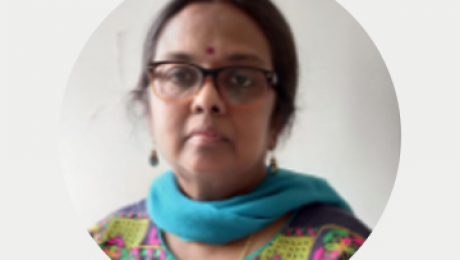Controlled loading of MoS2 on hierarchical porous TiO2 for enhanced photocatalytic hydrogen evolution
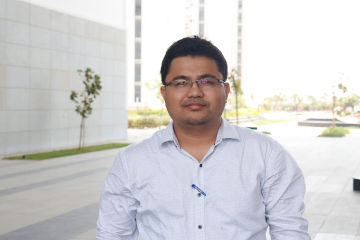 Ever since the breakthrough research on H2 photogeneration from water using TiO2 under UV-light irradiation, an enormous amount of research has been conducted on photochemical H2 evolution using different semiconductor-based photocatalysts. Consequently, a research paper titled “Controlled Loading of MoS2 on Hierarchical Porous TiO2 for Enhanced Photocatalytic Hydrogen Evolution” has been published by Prof Ranjit Thapa, Professor of Physics, SRM University – AP, as a co-author, in The Journal of Physical Chemistry C, having an Impact Factor of 4.189.
Ever since the breakthrough research on H2 photogeneration from water using TiO2 under UV-light irradiation, an enormous amount of research has been conducted on photochemical H2 evolution using different semiconductor-based photocatalysts. Consequently, a research paper titled “Controlled Loading of MoS2 on Hierarchical Porous TiO2 for Enhanced Photocatalytic Hydrogen Evolution” has been published by Prof Ranjit Thapa, Professor of Physics, SRM University – AP, as a co-author, in The Journal of Physical Chemistry C, having an Impact Factor of 4.189.
In this work, Prof Thapa describes three important factors for helping in the generation of hydrogen using proposed MoS2/TiO2 catalyst, (i) TiO2 for effective charge transfer, (ii) MoS2 for plasmon induction (iii) large surface area and active sites. It was shown that hierarchical porous TiO2 can be interfaced successfully with marigold-flower-like MoS2 flakes with intriguing photophysical properties, viz., visible-light response, controlled electron−hole recombination, and sustainable H2 production over prolonged light irradiation due to the synergic effect of flowerlike MoS2 and the fibrous wormhole mesoporous channel of TiO2. Further, the researchers have used density functional theory (DFT) to identify the active sites and calculated the change in Gibbs free energy (ΔGH). “We have also studied the charge density difference to understand about electron transfer pathway. The change free energy of hydrogen adsorption (ΔGH*) is a good indicator to estimate the hydrogen evolution activity in the acidic medium. From the DFT study, it is clear that O sites of MPT heterostructure are more favourable for HER reactivity”, said Prof Ranjit Thappa.
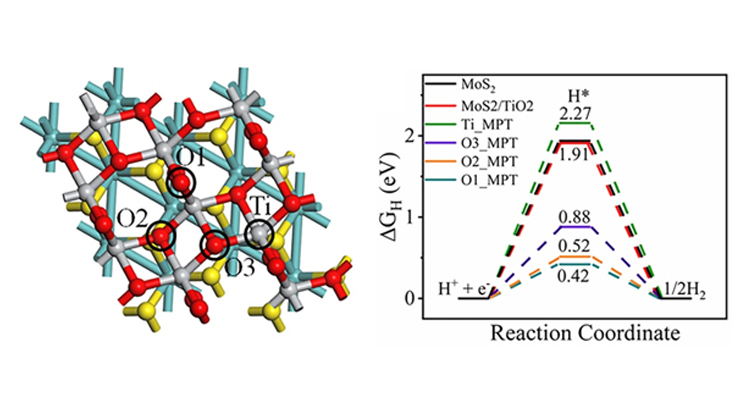
Social implications of the research:
In the last few decades, with the decline in non-renewable resources and increasing environmental pollution, significant attention has been given to renewable and clean energy domains. Hydrogen is considered one of the most suitable energy carriers due to its higher energy density per unit mass in comparison to other chemical fuels. In recent times, photocatalytic fission (Photocatalysis is a process in which light energy is used to drive pairs of chemical reactions. Through the absorption of light, an excited electron/hole pair is produced) of water has been considered an attractive solution for solar to chemical H2 energy conversion. Also, the process of water splitting is highly endothermic. Therefore, the development of an excellent, stable, efficient, and economical photocatalyst for ultrahigh H2 production efficiency is paramount to researchers.
This work is done in collaboration with the Department of Energy and Environmental Engineering, CSIR-Indian Institute of Chemical Technology, Hyderabad 500007, India.
Prof Ranjit Thapa is doing an investigation to find the possibility of hydrogen evolution reaction (HER) on multiple borophene analogues (α, β12, χ3) on all unique sites. Understanding the role of the coordination number of the boron atoms in the borophene analogues with the HER efficiency, and studying the pathways Volmer-Tafel (V-T) on each site to understand the completed HER process on borophene analogues are his future research projects. His research group is also interested to identify the role of sigma and pi-electron occupancy on the V-T pathway.
Read the full paper here: https://doi.org/10.1021/acs.jpcc.1c01922
- Published in Departmental News, News, Physics News, Research News
ARSDC Dean on industrial skills for core placements
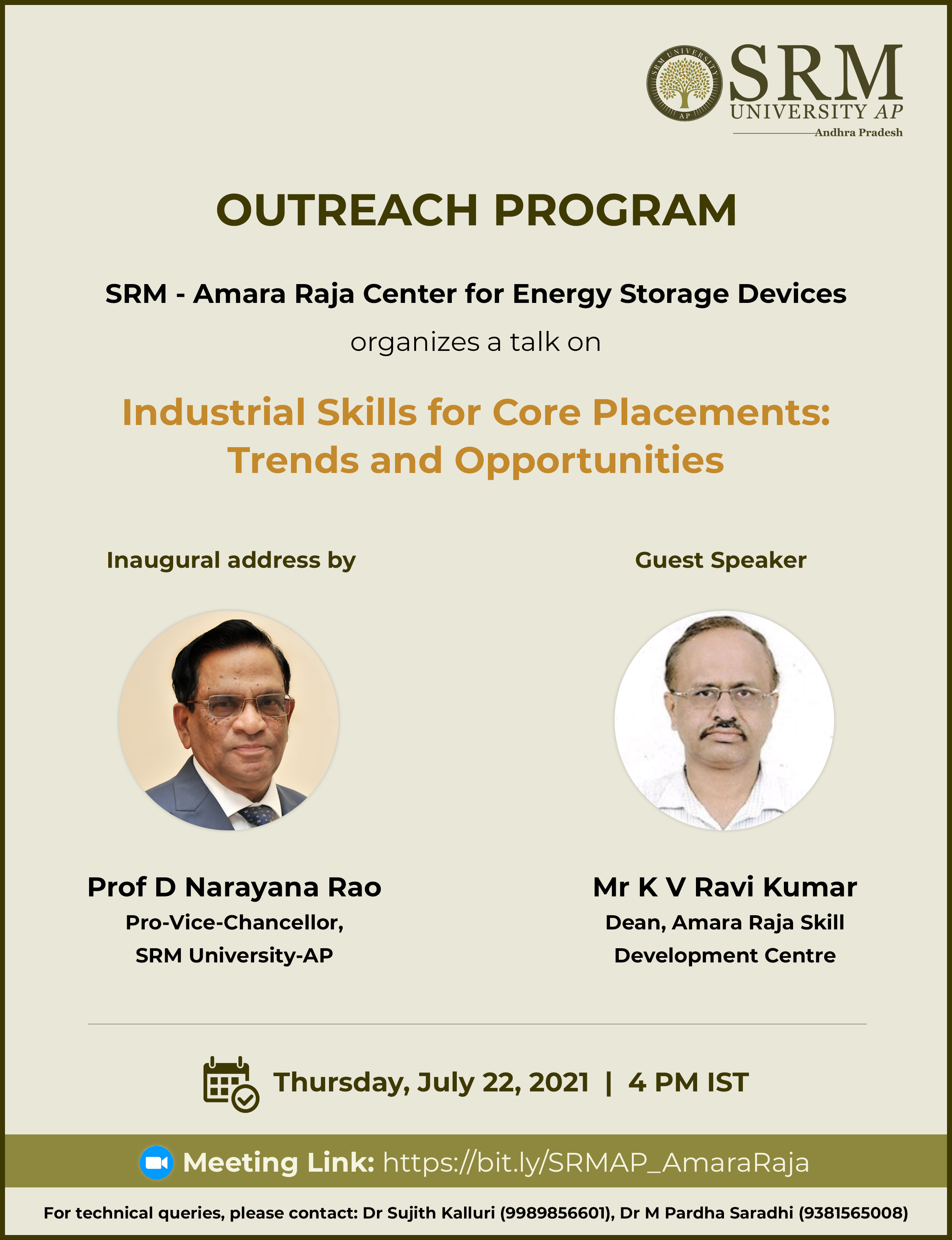 SRM – Amara Raja Center for Energy Storage Devices is organising an outreach programme on July 22, 2021, Thursday at 4.00 pm. Mr K.V Ravi Kumar, Amara Raja Skill Development Centre (ARSDC) will deliver a lecture on the topic “Industrial Skills for Core Placements: Trends and Opportunities”. Prof D Narayana Rao, Pro-Vice-Chancellor of SRM University-AP will inaugurate the session with his presence and thought-provoking oration.
SRM – Amara Raja Center for Energy Storage Devices is organising an outreach programme on July 22, 2021, Thursday at 4.00 pm. Mr K.V Ravi Kumar, Amara Raja Skill Development Centre (ARSDC) will deliver a lecture on the topic “Industrial Skills for Core Placements: Trends and Opportunities”. Prof D Narayana Rao, Pro-Vice-Chancellor of SRM University-AP will inaugurate the session with his presence and thought-provoking oration.
SRM – Amara Raja Centre is established to design and develop low-cost, fast-charging, next-generation Lithium-ion battery innovations for smarter E-mobility in collaboration with Amara Raja Batteries Ltd. (ARBL), in India. ARSDC is a government-approved training program under National Apprenticeship Promotion Scheme (NAPS). Mr Ravi Kumar will give an overview regarding skill development activities at ARSDC and how the works of the centre can facilitate B.Tech graduates.
The specific topics that will be covered in the talk are (i) The skills required to get campus placement, (ii) Skill development importance, (iii) 5Ws & 1H of skill development, (iv) ASK (Attitude, Skill, Knowledge) principle, and (v) About ARSDC (http://www.arsdc.co.in/). Dr Sujith Kalluri from the Department of Electronics and Communication Engineering is the coordinator of the event.
All are encouraged to attend this engaging outreach programme on July 22, 2021, at 4.00 pm.
Link to the session:https://bit.ly/SRMAP_AmaraRaja
To know more:https://srmap.edu.in/research-centres/srm-amararaja-centre/
- Published in Events
Insights into communication systems @ ECE Department
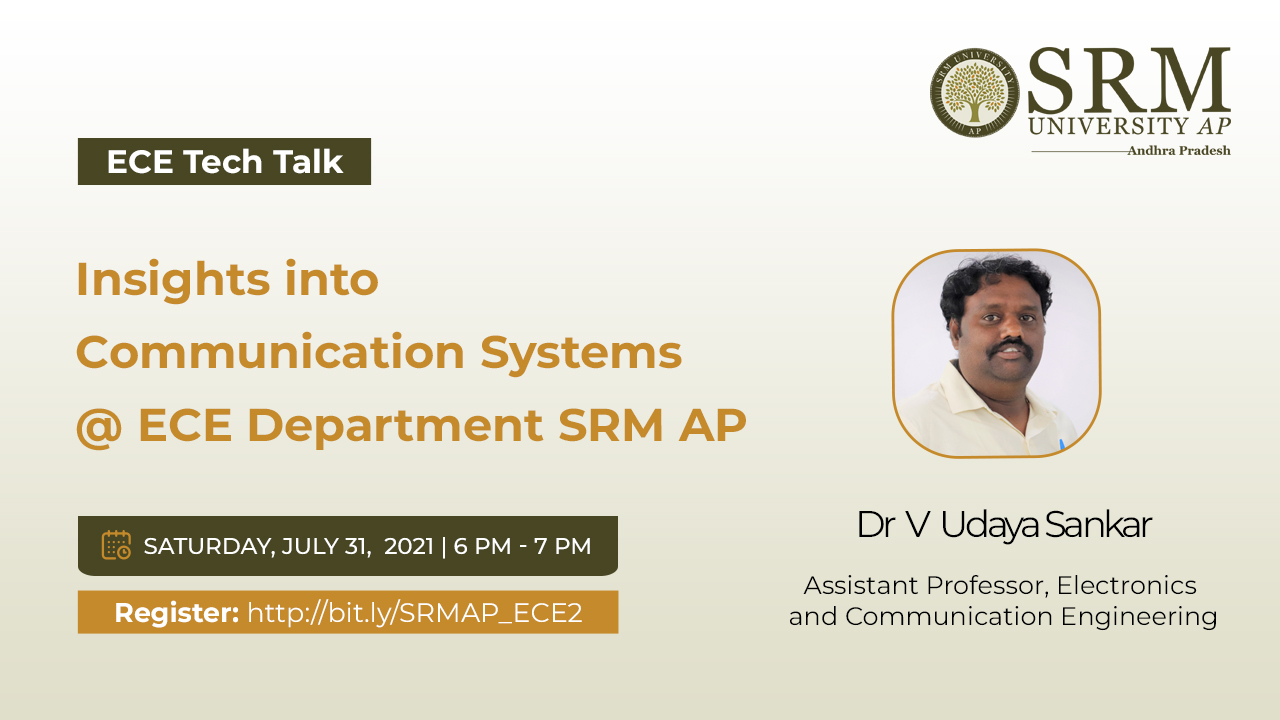 The Department of Electrical and Communication Engineering (ECE) at SRM University-AP is organising a webinar session on the topic “Insights into Communication Systems @ ECE Department SRM AP” on July 31, 2021, Saturday, at 6.00 pm. Dr V Udaya Sankar, Assistant Professor from the department will elucidate on the topic via the Zoom platform.
The Department of Electrical and Communication Engineering (ECE) at SRM University-AP is organising a webinar session on the topic “Insights into Communication Systems @ ECE Department SRM AP” on July 31, 2021, Saturday, at 6.00 pm. Dr V Udaya Sankar, Assistant Professor from the department will elucidate on the topic via the Zoom platform.
The Department of ECE fosters Future Communication Systems (FCS) research group which is actively involved in the theoretical and practical facets of communications systems and networks. The impact of such systems is of greater importance in the information-driven world in both the near and long term future. This research group spans the various aspects of communication & information theory, wireless communications, signal and image processing, wireless sensor networks, vehicular communications, Artificial Intelligence & machine learning, game theory & optimization, IoT etc.
Join this engaging webinar on July 31, 2021, to know more about the ECE department at SRM University-AP that focuses on applying the theoretical concepts to the practical applications in cellular communications, defence, satellite, consumer electronics, health care, remote sensing and the environment.
Register here: https://srmap.zoom.us/webinar/register/WN_TmwIIaTIRouq1pBlBbjYSA
- Published in Admission Events - Domestic, Departmental Events, ECE Events, Events
Ajay Sugandh secures admission to IIM Ranchi
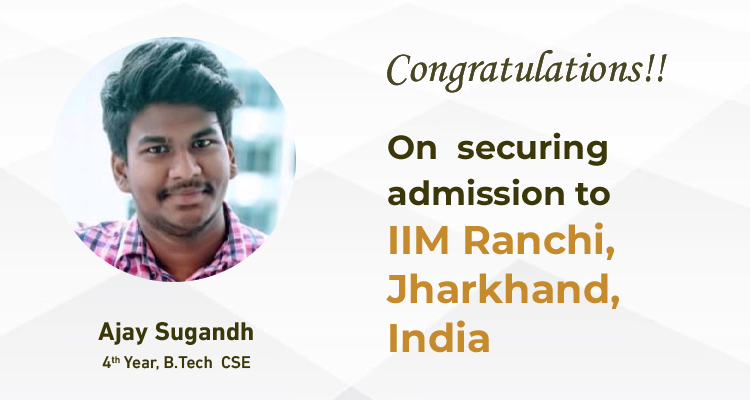 For Ajay Sugandh, securing admission to one of the prestigious Indian Institutes of Management (IIM) is a dream come true. Clearing the Common Admission Test (CAT) with a percentile of 90, he has bagged an admission offer at IIM, Ranchi. CAT is a national-level computer-based management entrance examination to reputed IIMs. More than 2 lakh candidates appear for the test and a few with a percentile of 90-99 secure a position on one of the IIM campuses.
For Ajay Sugandh, securing admission to one of the prestigious Indian Institutes of Management (IIM) is a dream come true. Clearing the Common Admission Test (CAT) with a percentile of 90, he has bagged an admission offer at IIM, Ranchi. CAT is a national-level computer-based management entrance examination to reputed IIMs. More than 2 lakh candidates appear for the test and a few with a percentile of 90-99 secure a position on one of the IIM campuses.
IIM Ranchi is a reputed business school established in the year 2009 and is the ninth IIM in the country. It holds the 10th rank in the NIRF ranking. The eligibility of the candidates is evaluated through CAT, followed by the written eligibility test (WAT) and Personal Interview (PI).
Ajay Sugandh is a CSE graduate hailing from Guntur, Andhra Pradesh. After completing an MBA from IIM, Ranchi, he wishes to pursue a career in Marketing. Ajay is trained by the TIME coaching institute that helped him crack the difficult test. He had prepared for a year and worked on soft skills, aptitude etc. His hobbies include watching movies and reading books.
Speaking of the support received from SRM University-AP, Ajay acknowledged, “Firstly, I am grateful to the faculty members of the Department of CSE who have been a constant support in reaching my goals. Secondly, the tremendous support from all my peers and family has encouraged me to manage my course CAT preparation together”.
- Published in CSE NEWS, Departmental News, News, Students Achievements
CSIR-CCMB chief scientist talks in the Biological Sciences webinar
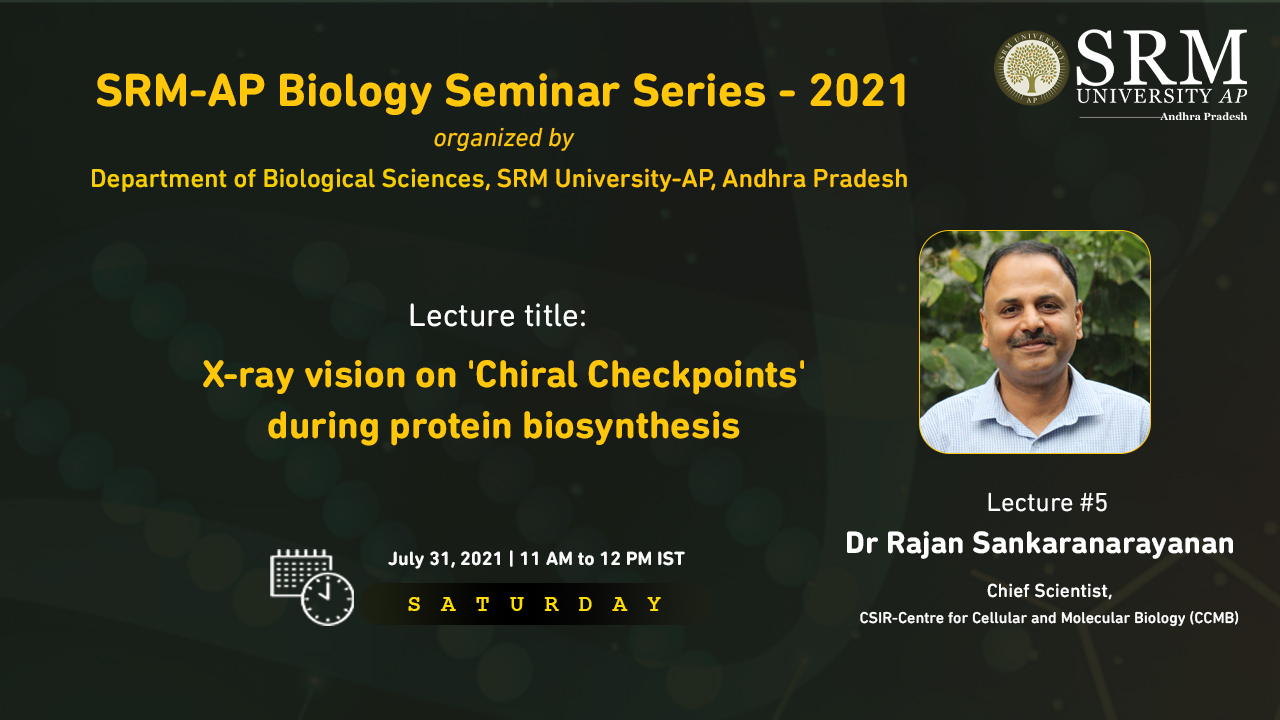 The latest episode of the webinar series conducted by the Department of Biological Sciences in SRM University-AP is scheduled for July 31, 2021, at 11.00 am. Dr Rajan Sankaranarayanan, Chief Scientist at CSIR-Centre for Cellular and Molecular Biology (CCMB) will give a lecture on the topic “X-ray vision on ‘Chiral Checkpoints’ during protein biosynthesis” in the session. Faculty and research scholars from the department will join the speaker on the panel.
The latest episode of the webinar series conducted by the Department of Biological Sciences in SRM University-AP is scheduled for July 31, 2021, at 11.00 am. Dr Rajan Sankaranarayanan, Chief Scientist at CSIR-Centre for Cellular and Molecular Biology (CCMB) will give a lecture on the topic “X-ray vision on ‘Chiral Checkpoints’ during protein biosynthesis” in the session. Faculty and research scholars from the department will join the speaker on the panel.
Protein chains contain only l-amino acids, with the exception of the achiral glycine, making the chains homochiral. This homochirality is a prerequisite for proper protein folding and, hence, normal cellular function. As a scientist, Dr Sankaranarayanan comprehensively reviews d-amino acids with respect to their occurrence and physiological roles, implications for chiral checkpoints required for translation fidelity, and potential use in synthetic biology. He has co-authored and published a research paper titled “Chiral checkpoints during protein biosynthesis” in the “Journal of Biological Chemistry”.
Read the full paper here:https://doi.org/10.1074/jbc.rev119.008166
About the Speaker:
Dr Rajan Sankaranarayanan obtained Bachelors and Masters in Physics from Madurai Kamaraj University and his PhD from the Molecular Biophysics Unit, Indian Institute of Science, Bangalore in 1996. He was a postdoctoral research fellow at IGBMC, Strasbourg, France from 1996-2002. Dr Sankaranarayanan, after returning to India in 2002, has set up a state-of-the-art macromolecular crystallography laboratory and is carrying out research in the field of Structural Biology. From CCMB, his group has made outstanding contributions in the area of proofreading during protein biosynthesis. He was awarded the prestigious Wellcome Trust International Senior Research Fellowship, UK in 2003, Swarnajayanthi fellowship of the DST, India in 2005-2006, National Bioscience Award of DBT in 2008, Shanti Swarup Bhatnagar award in 2011, GN Ramachandran Gold Medal in 2015 and Infosys Science Prize in 2020. He is an Associate Editor of Journal of Structural Biology and Board of Reviewing Editor of the journal eLife. He is also a fellow of all the three major science academies of the country.
Join this free informative webinar on July 31, 2021, 11.00 am onwards to gain research insights from the field expert.
Register here:https://srmap.zoom.us/webinar/register/WN_l7rK4UOfTFGFUiHe7W2OMA
- Published in Biology Events, Departmental Events, Events
SRMAP Students launch start-up
The Hindu – July 16
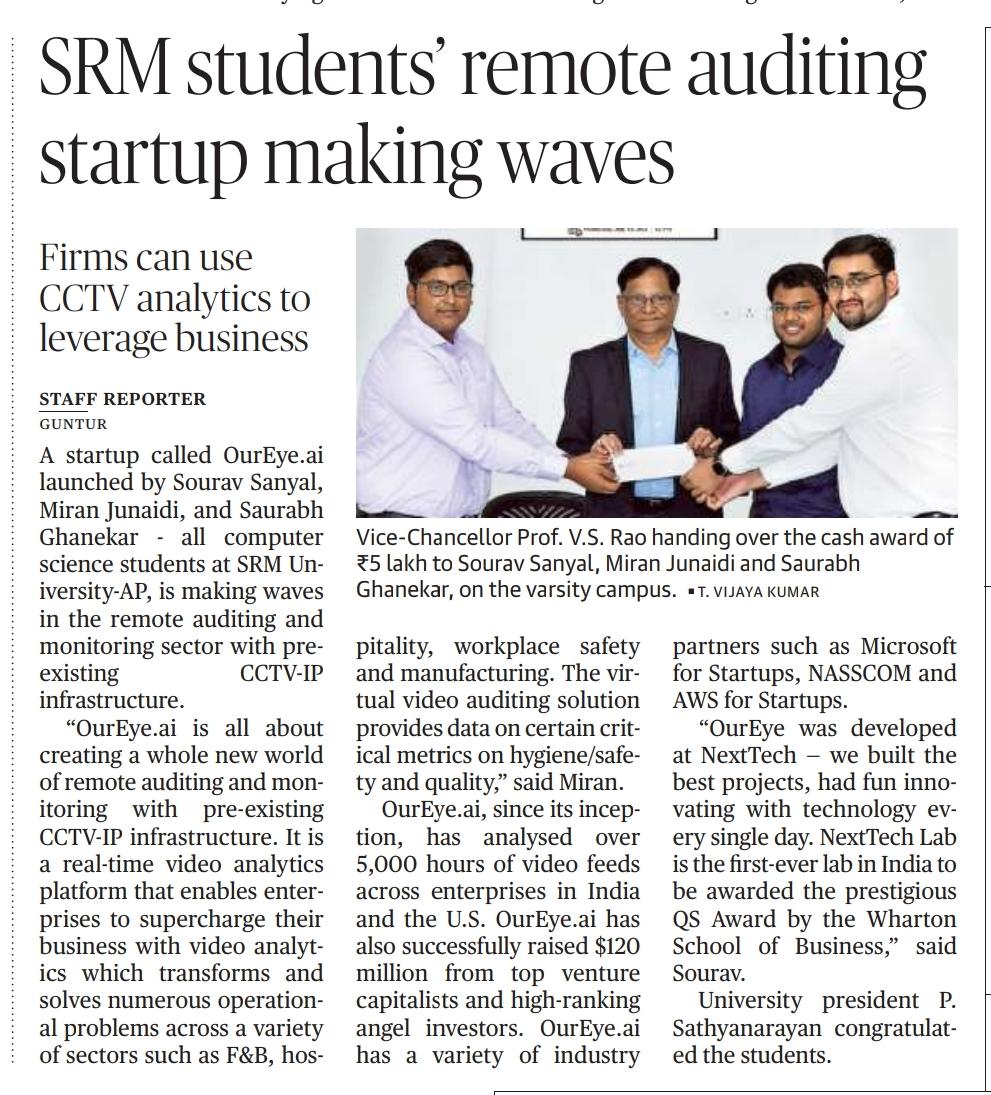
Daily Pioneer – July 16
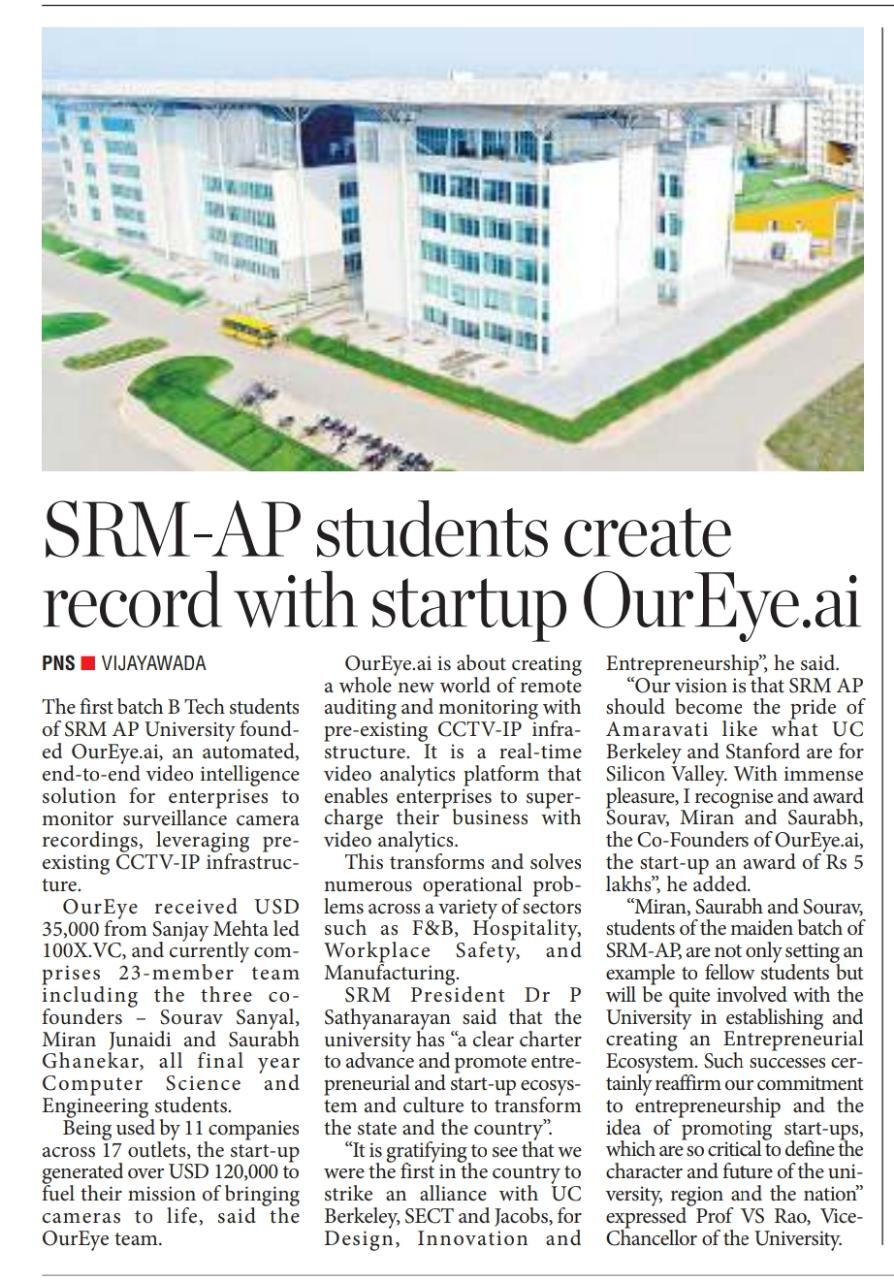
The Times of India – July 15
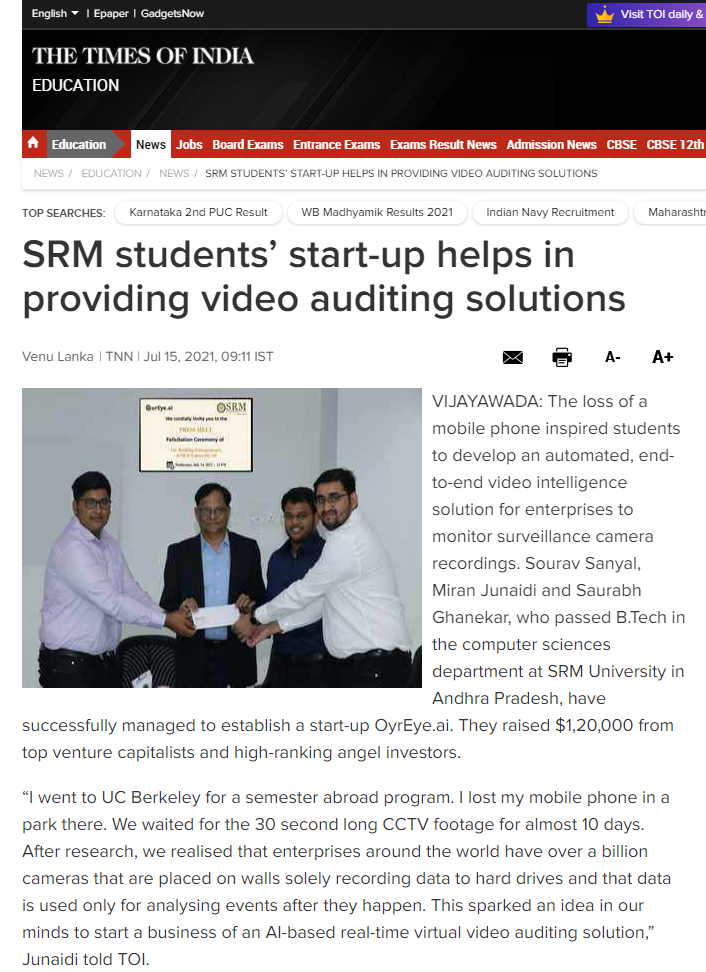
New Indian Express – July 15
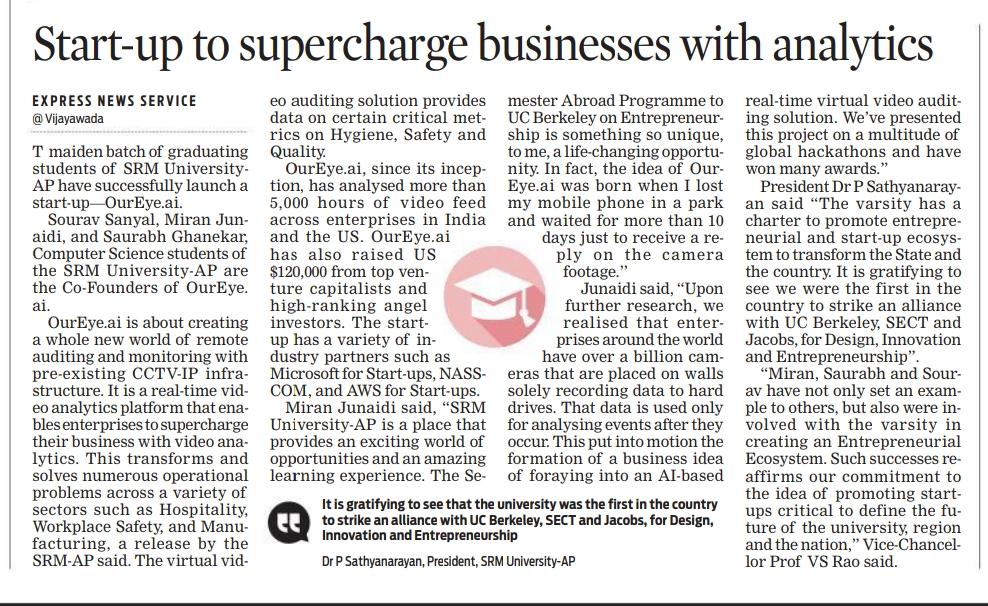
The Hindu Education Plus – July 20
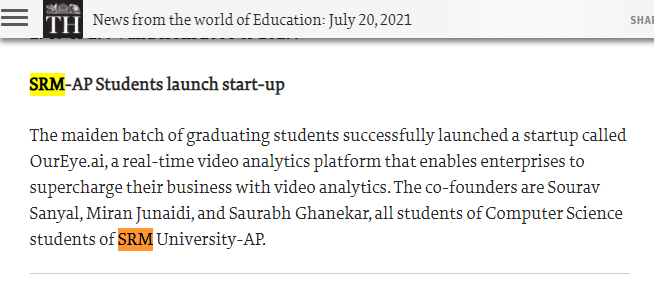
Tripura Times – July 17
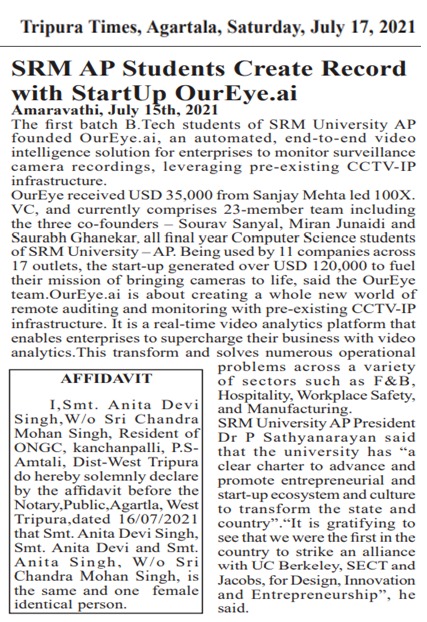
The Meghalaya Guardian – July 17

The Eastern Chornicle – July 17
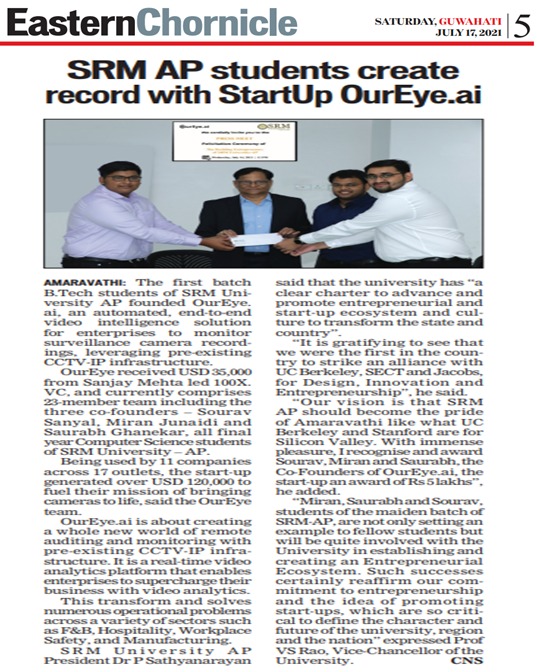
NorthEast Times – July 17
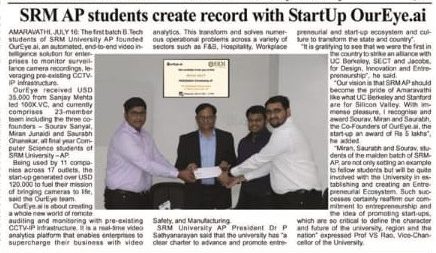
The Mizoram Post – July 17
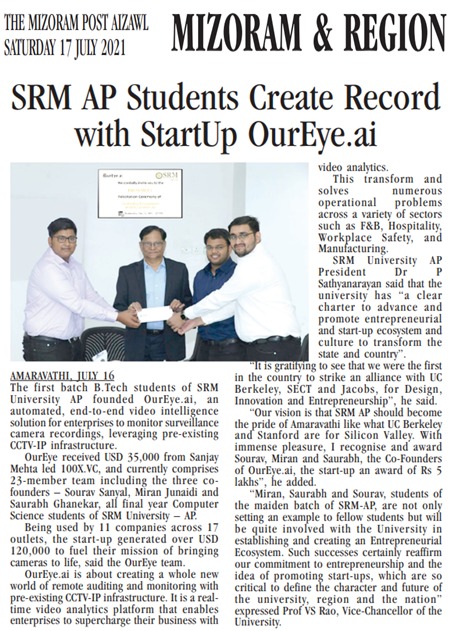
The Meghalaya Guardian – July 17

Dainik Arth Prakash – July 17
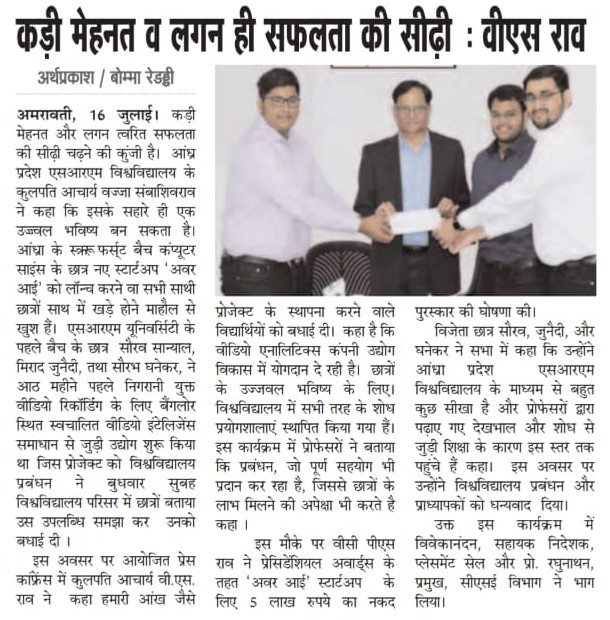
Andhra Prabha – July 15
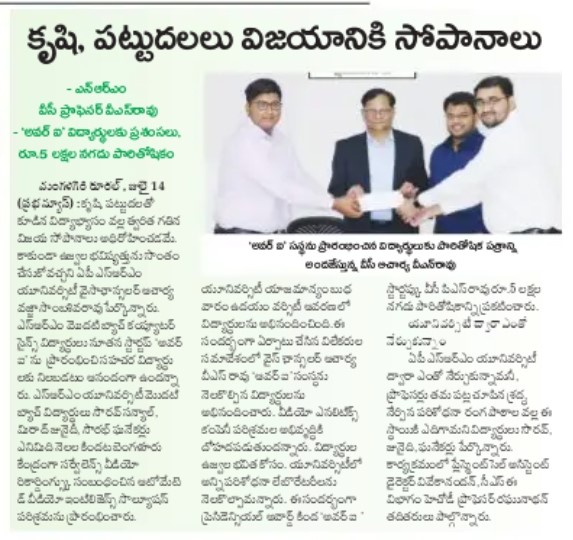
Eenadu – July 15
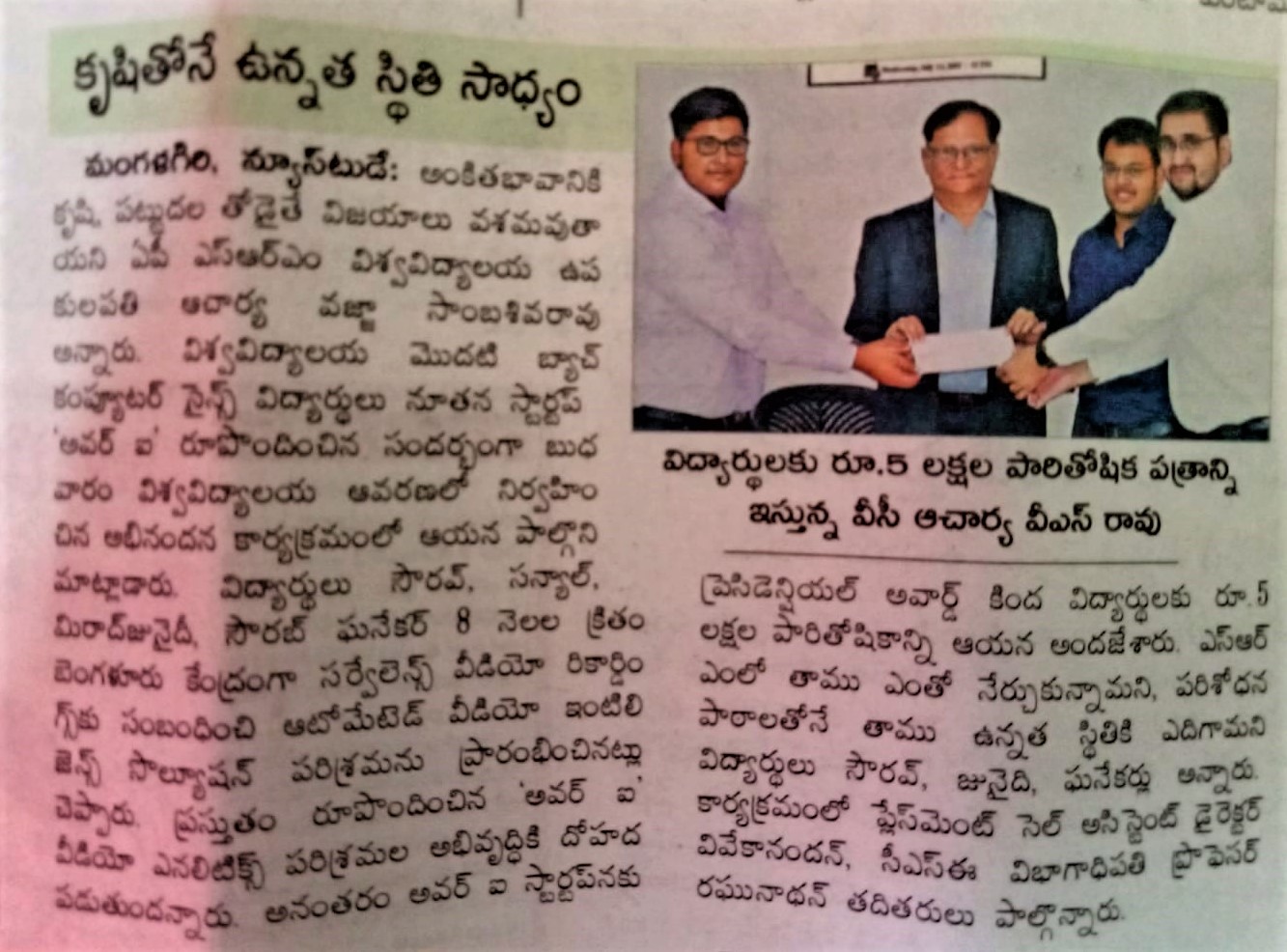
Prajasakthi – July 15
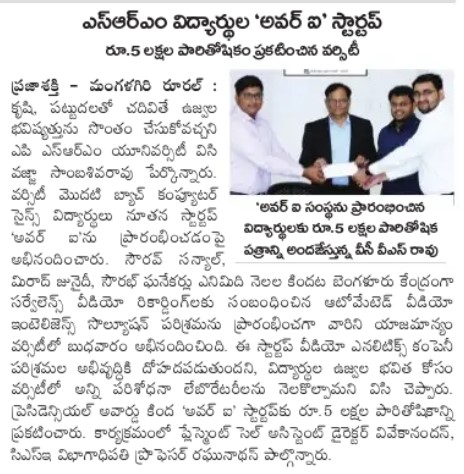
Sakshi – July 15
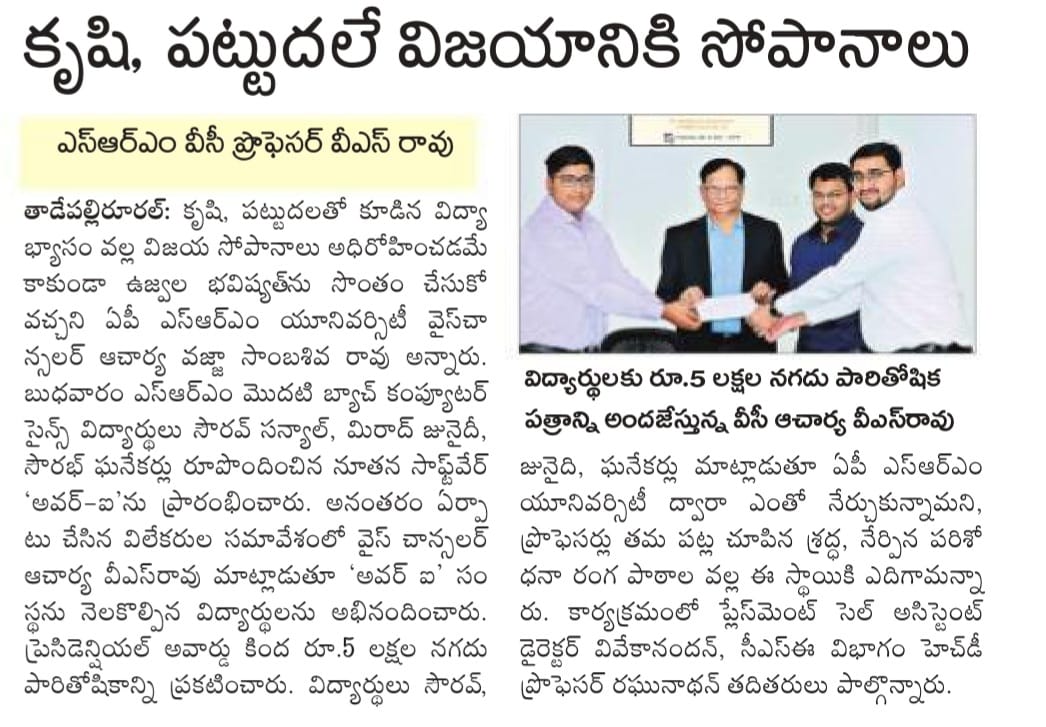
Surya – July 15
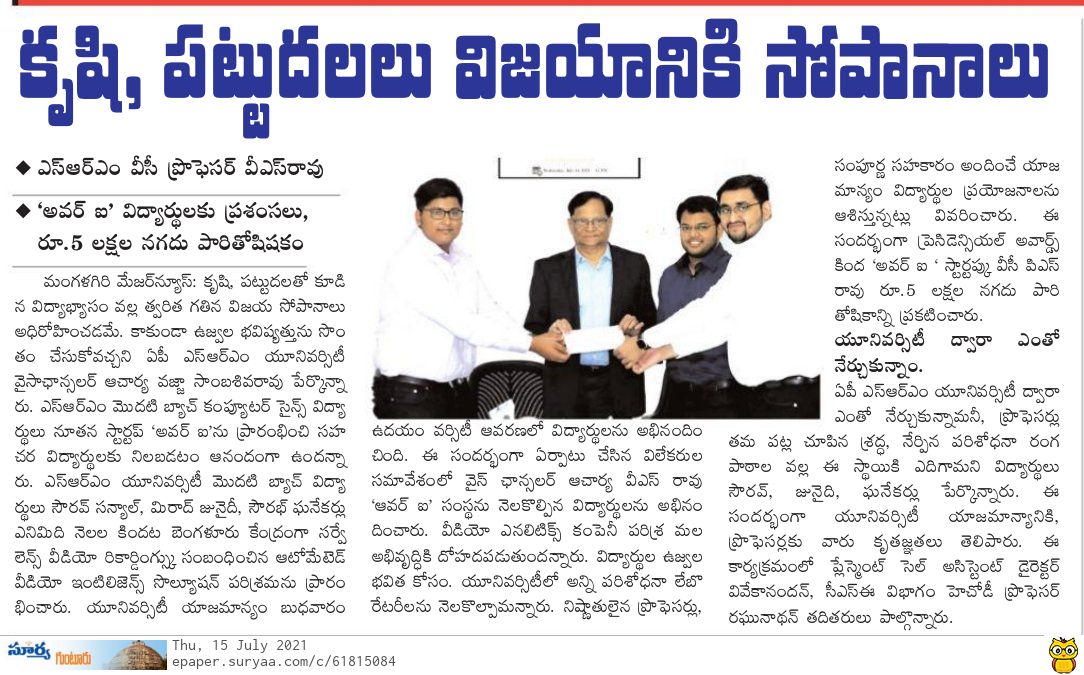
Vaartha – July 15
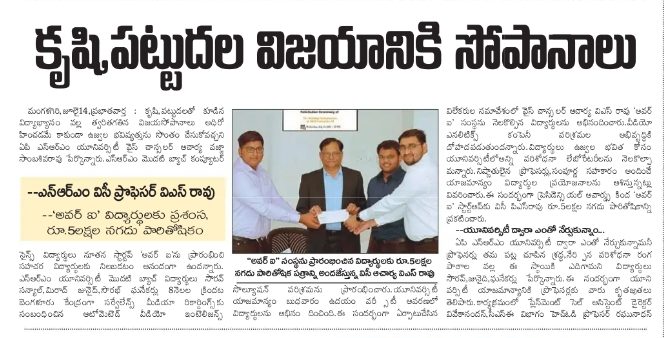
Vartha Prapancham – July 15
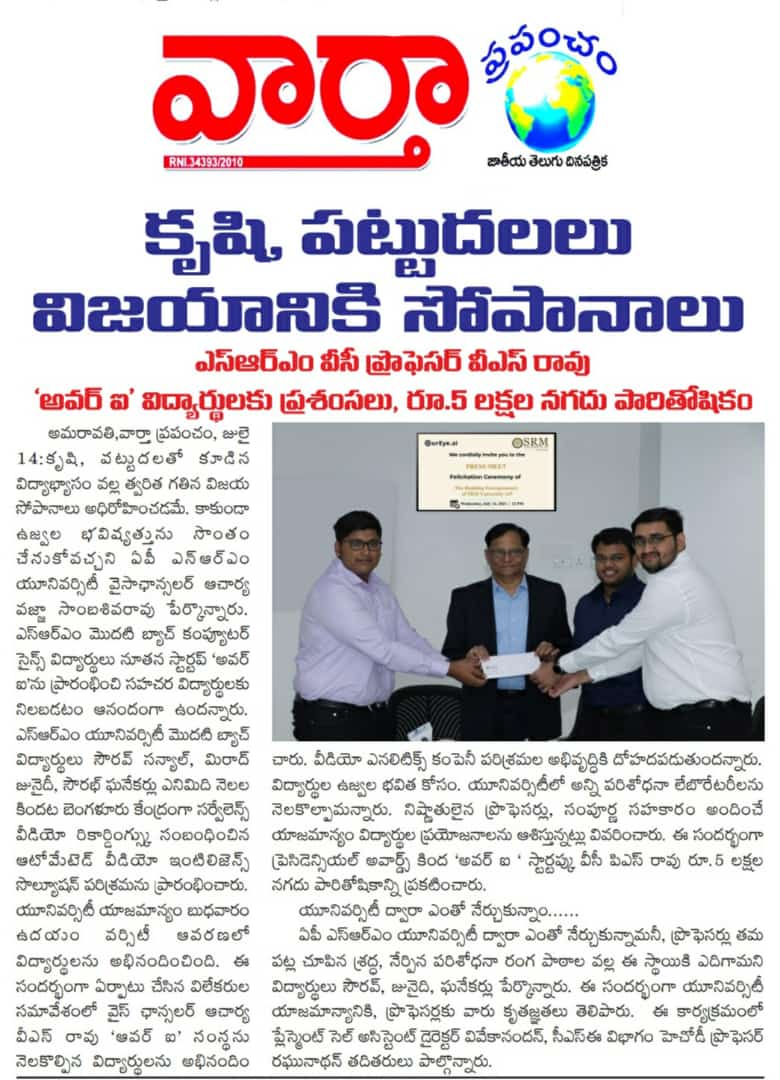
Visalaandhra – July 15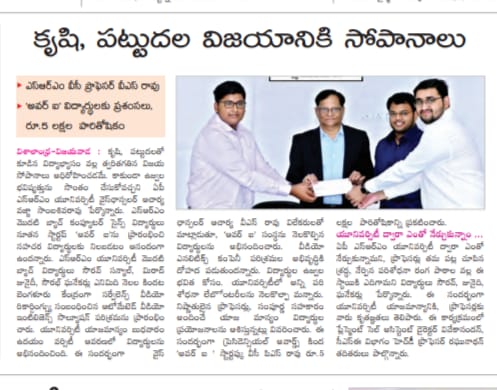
– Navbharat 23
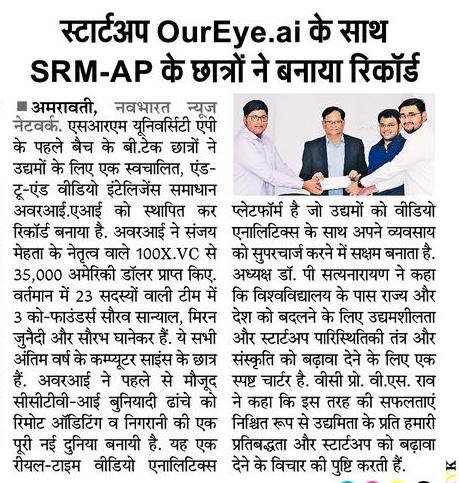
– Higher Education Digest 15

- Published in Newsroom
Sruti Poolla on the highs and highlights
From the virtual tour of the campus to online learning and events, Sruti Poolla, student of Class of 2023 at SRM University, AP has been wowed by the experiences she has had. Bonding with her batch mates from around the country and participating in diverse discussions, she has learned the importance of looking at global problems from different perspectives. As she eagerly waits to explore the campus, Sruti offers her own perspective on her first year in college.
“Can you believe it; I have been doing my B.Sc. (Hons.) Economics from SRM University, AP for a year but haven’t visited the campus once! But we are playing with the cards we have been dealt with and it’s been a lot of fun.
We had a virtual tour of the campus again on the orientation day, and it just blew my mind. I saw the library and the hostel rooms and was completely bowled over. I cannot wait to get on the campus and visit the library, as well as the basketball court. Besides that, I want to sing on stage.
It has been a joyride right from the virtual orientation where we had all our queries about the University and department answered. The online Freshers event was a lot of fun, and I have also participated in carnivals.
As far as learning goes, I really didn’t think it was possible online. But our faculty members have gone to great lengths to make it engaging and exciting for us. We have our classes on Zoom and we have breakout rooms, polls, which encourage us to participate in the learning process.
It has also offered us the platform to interact with our peers and batch mates. We are connected on Whatsapp groups and have bonded quite well. Interacting with students from different states, backgrounds, and cultures is an enriching experience in itself.
I’d say that my friends are quite opinionated, which is great because you are always learning something new. In fact, that has been my biggest learning experience so far – knowing that there are many perspectives to any global problem.
I am really looking forward to being on campus so that I can explore my college years to the fullest. We have all the platforms to take on new challenges and grow into well rounded individuals and professionals. I am definitely ready for it.”
- Published in Blog, other blogs
Rasheed Amina Karim Firdous finds his true calling
It is the second time lucky for Rasheed Amina Karim Firdous who found exactly what he was looking for at SRM University, AP. After pursuing a semester in Computer Science Engineering, the young man from Vijayawada dropped out only to find his true calling. The B. Sc (Hons.) Economics, Class of 2023 student looks back on his first year at the university and tells us why he feels he is in the right place at the right time.
“Unlike most of my batch mates, my college journey began differently. I pursued a semester in Computer Science Engineering but realized that it wasn’t for me. Around that time, my father was seriously ill so I dropped out for a semester. The gap and space I had made me realize what I really wanted, and this time I found exactly that at SRM University, AP.
I enrolled for B. Sc (Hons.) Economics program and to my surprise my story resonated with that of our faculty Ms. Shrabani Mukherjee. When she shared her story with the class I felt instantly connected and knew that I was in the right place. Her encouragement has motivated me and made me more disciplined towards academics, especially at a time when I was feeling unsure and unsteady.
Everything at the university has been a pleasant surprise from day 1. Let’s start with the virtual campus tour, which had me mesmerized. It is wonderful to see that the campus has been built while keeping the balance between aesthetics and the environment. It has all the modern amenities that are designed keeping students’ needs in mind.
The virtual orientation was planned with activities on mental health, yoga, budget as well as some fun tournaments. It was particularly thoughtful to focus on mental health in the last year of uncertainties. I am grateful to be able to pursue my studies on a brilliant platform with caring faculty members to guide us along the journey.
We have a Google classroom where we can access all the notes, presentations shared by our faculty members. We have Zoom calls for meetings with breakout rooms that invariably lead to amazing discussions. We can connect with our batch mates on Zoom, whatsapp or regular calls. We discuss ideas, play games and have built camaraderie.
It’s one of the main reasons I want to get on the campus as soon as possible. We have students from various states, who bring their own cultures, traditions, view points to the campus. Everyone has their own talents; one is a singer, someone else is into cricket. It is such a stimulating environment and I can’t wait to participate in those thought provoking discussions in person.”
- Published in Blog, other blogs
ECE students accomplish international internship in Canada
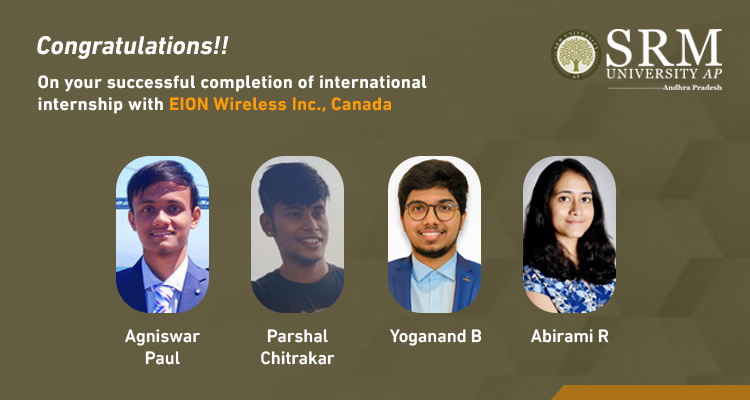 Yoganand B, Parshal Chitrakar, Agniswar Paul, Abirami Ravishankar are four brilliant students from the Department of Electronics and Communication Engineering at SRM University-AP who have successfully completed an international internship with EION Wireless Inc, Canada. The students worked as engineering interns with this reputed wireless solutions firm in Canada for five and a half months (Jan 15- June 30) obtaining an internship salary of 500 CAD per student every month. Through this opportunity, the students could build a system that is able to send data to long distances.
Yoganand B, Parshal Chitrakar, Agniswar Paul, Abirami Ravishankar are four brilliant students from the Department of Electronics and Communication Engineering at SRM University-AP who have successfully completed an international internship with EION Wireless Inc, Canada. The students worked as engineering interns with this reputed wireless solutions firm in Canada for five and a half months (Jan 15- June 30) obtaining an internship salary of 500 CAD per student every month. Through this opportunity, the students could build a system that is able to send data to long distances.
Selection Process:
a. Internal selection: Based on the CV and projects undertaken, the ECE Faculty conducted interviews and shortlisted the students.
b. Personal Interview: The shortlisted students attended the interview with the company in which, the company scrutinised their project, skills, and whether they were relevant to the company’s requirements.
c. Techincal Interview: This round focused on analysing technical skills. A technical problem statement was given to members and was asked to come up with a solution in 10 minutes.
d. Coding test: In this round, coding questions were distributed and students had to submit documents of output and on how the code was processed.
For engineering graduates, technical skills and hands-on experience with industry is inevitable. SRM University-AP ensures that every student grabs opportunities to excel in their respective disciplines.
Student Testimonial- Parshal Chitrakar:
I would like to thank the faculty of the ECE Department at SRM AP for this great opportunity. Being a part of this internship programme by EION wireless has been one of my first and best experiences in the industry. Being a fresher, this opportunity gave me a chance to apply my knowledge and skills in developing real-time applications. This five and a half months internship taught me different ways to look at things, work with people from diverse backgrounds, and helped me develop my technical as well as soft skills. Before this, I was focused only on personal achievements, but when we work for a company it has to be focused on the public demand and common good. I think this is the main difference between academia and industry. There is no such difference between academic-based projects and industry-based projects; it is just how we think, showcase our abilities and how our work reaches the target stakeholders.
- Published in Departmental News, ECE NEWS, News, Students Achievements


